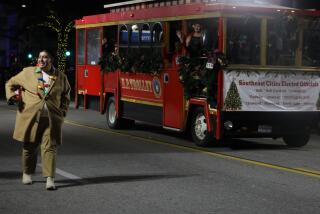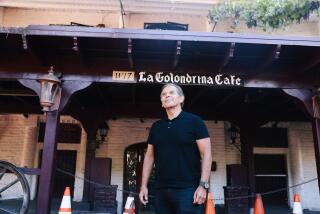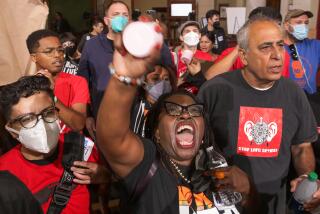Protesters in Bell seek ouster of mayor, vice mayor and 2 councilmen
Nearly 300 residents marched through the streets of the city of Bell on Sunday, demanding the resignation of the mayor, the vice mayor and two members of the City Council after revelations that officials in one of the smallest and poorest cities in Los Angeles County were paid unusually high salaries.
It was a striking demonstration for a working-class city where civic engagement traditionally has been muted. The raucous crowd trudged to the homes and workplaces of Mayor Oscar Hernandez, Vice Mayor Teresa Jacobo and City Council members Luis Artiga and George Mirabal, each time pausing for a moment of silence and reflection, then erupting with cries of “fuera!” — “out!”
Some in the crowd showed up wearing T-shirts featuring a city seal and the words: “My city is more corrupt than your city.”
Protester Miguel Sanchez, 33, said he used to work for City Hall, running an after-school program and teaching students and elderly residents basic computer skills. In late 2008, he said, his job was eliminated.
“They told me that the town didn’t have enough money to pay for it anymore,” he said Sunday. “I said: ‘I can’t be greedy. It’s a recession. I understand.’ Then I found out about this, and I was outraged. We are all outraged.”
The protest teed up what promises to be a contentious week in Bell, with a City Council meeting scheduled for Monday evening and a resident-generated “town hall” meeting later in the week.
A fifth member of the City Council, Lorenzo S. Velez, called Sunday for his colleagues to reduce their salaries to what he earns from City Hall for the part-time post: $310.62 every two weeks. Velez has escaped the wrath of the public thus far because he earned a pittance compared with his colleagues — and said he was stunned to learn of the disparity.
However, organizers of Sunday’s protest said a reduction in salary would be insufficient and called for the other members of the City Council to resign. The other members of the City Council earn roughly $100,000 each, salaries that are far higher than those earned by council members in comparable cities. The figures have baffled and angered good-government advocates.
“This city has woken up,” said Jesus Casas, 35, a Bell resident for 15 years. “They all knew what they were doing.... We want a city government that will represent by the people and for the people”
Like many of the demonstrators, Casas said he viewed the issue as a struggle for the future of the town itself and accused the city officials of treating Bell as a fiefdom.
“Revolutions are caused by inequality, by a conflict between social classes. And that is what you have here,” Casas said. “A united town will succeed.”
This month, The Times revealed that City Manager Robert Rizzo received a $787,637 annual salary, police Chief Randy Adams received $457,000 and Assistant City Manager Angela Spaccia received $376,288. Rizzo earned more than President Obama, Adams earned 50% more than Los Angeles Police Chief Charlie Beck and Spaccia earned more than the top administrator for Los Angeles County. All three resigned on Friday, and irate residents have now turned their attention to the City Council.
“I don’t think they are taking it seriously. And we’re serious,” said Nestor Valencia, 45, an organizer of Sunday’s demonstration, a Bell resident since 1975 and a founder of the Bell Resident Club. “This is a test for our community. There’s been a fiasco here.”
The protest was a boisterous affair, replete with children in strollers, whistles, maracas and toy trumpets. Demonstrators waved American flags and carried signs that read “3 down, 4 to go” and “Stop the Fraud.” The march passed bakeries, muffler shops and old-time hair salons full of curious women who craned their necks toward the noise. Hundreds of passing cars honked their support, even when the procession blocked busy intersections.
Diane Oliva, 41, who attended Bell High School, brought Marley, her 2-year-old Terrier mix, decked out in sunglasses. Marley, she said, prefers canned wet food, but has been forced to make do with kibble — “because I have to pay Bell property taxes.”
“He’s upset, so he wanted to show his support,” she said with a laugh.
Oliva said she hoped the protest and pressure from the community would prompt the mayor and the council members to quit.
“We’re hoping they have the integrity to resign,” she said. “If not, we’re just going to have to go to a recall. It’s going to take years to change everything after all of this, but change will start with getting them out of office.”
Demonstrators gathered first on the stoop of Bell Community Church, where Artiga is a pastor. Artiga was appointed last year to fill an unexpired term, and when he received his first paycheck from the city, he said he thought it was a “miracle from God.” Artiga was not there.
They then gathered outside a small grocery and meat market owned by Hernandez, then outside the mayor’s house. The mayor was not at either location.
Next on the itinerary was a home owned by Mirabal, followed by a stop at the home of Jacobo. Neither appeared to be at home, and none of the officials could be reached for comment on Sunday.
The crowd made one more stop, outside a Chevrolet dealership that had been a fixture on Atlantic Avenue before it closed down earlier this summer, citing the town’s high property taxes. Demonstrators stopped for a final rally on the grassy plot outside City Hall, near Gage and Pine avenues.
The footprint of Bell, hidden away on the west bank of the Los Angeles River in southeast L.A. County, is just 2 1/2 square miles; it is such a small town the protesters only had to walk three miles, roughly, in order to make seven stops.
Participants said they will not end their protests with the resignations of the mayor and the council members. They said they have concerns that Pedro Carrillo, who has been appointed interim city manager in the wake of Rizzo’s resignation, might have ties with some city officials they view as complicit in corruption.
They also pledged to fight to ensure that none of the officials linked to the scandal earn publicly financed pensions, and they demanded investigations into several real estate deals involving publicly owned property — transactions they called questionable or harmful to the city’s meager finances. And they demanded to know whether the public would be forced to pay the officials’ legal fees.
“Everything they did was behind closed doors,” said Alex Paredes, 64, a resident for 44 years. “Everything they did was for themselves, not for the residents.”
More to Read
Sign up for Essential California
The most important California stories and recommendations in your inbox every morning.
You may occasionally receive promotional content from the Los Angeles Times.











